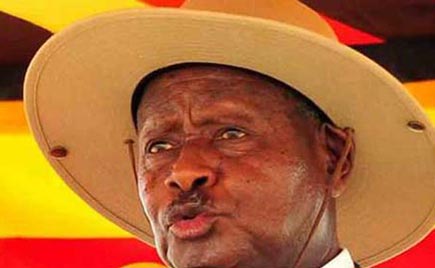KAMPALA. President Museveni has ordered ministries to stop declaring state of emergencies without his prior approval of their messages to the public.
He accused government officials of using loose words which have ended up scaring away potential investors and tourists.
President Museveni voiced his concerns in a letter he wrote to the Vice President and copied to all permanent secretaries of all ministries on January 20, this year.
He told Vice President Edward Ssekandi and all permanent secretaries of the respective ministries that emergencies or natural disasters like earthquakes and landslides should be handled with accurate information with his input. As a follow-up, Mr Alex Kakooza, the PS for ministry of Education and Sports on March 6 wrote to his various departments demanding that before his officers make any utterance to the public regarding emergencies, they must first seek and obtain clearance from the President.
In the letter ‘Panicism and Stampeding in Wrong Directions in Government Communication’ Mr Kakooza highlights that government officials’ statements have often alarmed the public putting the country’s security at risk.
Mr Kakooza quotes the President’s letter where Mr Museveni cited the declaration of bird flu epidemic in January, which caused panic locally and internationally and some countries banned poultry exports from Uganda.
“The President decried the loose and often carelessly spoken words by public officials which frighten or cause panic among the public. The loose words even scare potential investors and tourists to the country. He (the President) has guided that any information that is likely to threaten the prosperity and security of the country must never be issued without his clearance, as the Head of State,” Mr Kakooza’s letter to heads of department reads in part.
Mr Kakooza further told his subordinates: “He [Mr Museveni] cited the use of words like bloodbath for small or village clashes, epidemics for diseases such as the recent case of bird flu at Lutembe Beach. In case of emergencies like quarantines prior approval of his Excellency is mandatory.”
We could not reach minister of Information Frank Tumwebaze for a comment on the President’s directive to have government messages cleared by him or with his input as the minister’s cellular phone was off air.
However, the Uganda Media Centre Executive director, Mr Ofwono Opondo, said the President can’t have an input in every emergency unless it has a national security threat.
He cited an example of the cancer machine at Mulago National Referral Hospital, which broke down. Mr Opondo said although it was an emergency, it didn’t require the President’s intervention except the Finance ministry, which provides the money and the Health ministry, which directly supervises the facility.
“The President can’t have an input in every emergency. It has to be a national security concern. The alarmist was the bird flu and cholera outbreak. You may have information on these, but how do you give it to the public without causing a pandemonium?” Mr Opondo said in a telephone interview yesterday.
He said government communication has been harmonised under the Ministry of Information and they always form an emergency response committee which brings together relevant agencies depending on the catastrophe.
The President’s directive provoked a different view from the Opposition.
The Forum for Democratic Change party spokesperson, Mr Ibrahim Ssemujju Nganda, scoffed at the President’s directive saying the Head of State is paying the price of employing incompetent people. “The trouble with President Museveni is that he operates a government that doesn’t access him at all. I can understand the need to harmonise positions before they are made public, but personalising them is not a solution,” Mr Ssemujju argued.
“He is raising a red flag that his people are incompetent. All he needs to do is to appoint competent people but not to micromanage the government. Very soon, he will ask doctors that before you carry out an operation, they should first consult him,” Mr Ssemujju mused.
The Minister of State for Relief and Disaster Preparedness, Mr Musa Ecweru, said the President’s communication is to ensure all government bodies are on the same footing with him but is not intended to gag anyone.
“There is no harm informing the public; it is for purpose of being on board with him. It is not for gagging anybody,” he said.
He argued that as head of state, the President needs to know the extent of the disaster or outbreak to assess whether it merits to be declared an emergency.
“The President is the chief. He needs to be informed that there is a magnitude of this problem. He is saying that the contingency fund should only be touched only with consultation and clearance from him. This is to track the way funds are used. If you don’t do that, even if a truck of sand fell, some people might go saying it is an emergency,” Mr Ecweru argued.
He said he concurs with the President’s demand to approve or have an input in messages about emergencies. “When you announce that there is bird flu, you need to be very sure because it can cause a lot of stampede,” he said.
In January, the Permanent Secretary of Ministry of Health, Dr Diana Atwine, told Daily Monitor that there had been “massive deaths of migratory birds at Lutembe Beach” due to avian flu, and additional cases in ducks and chicken were detected 10 days later in Masaka District.
Subsequently, neighbouring countries banned the importation of poultry products from Uganda
©Alleastafrica and Daily Monitor



